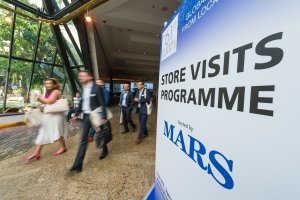As home to this year’s Global Summit, Vancouver is one the world’s most diverse and dynamic global cities. Its west coast location enshrines its position as a global gateway. These elements come together to create a unique food and consumer goods market, powered by a mix of national powerhouses and innovative local leaders. As part of the CGF Summit this year, IGD will be hosting a tour bus showcasing first-hand the dynamic retail trends in this fascinating city. We look at three trends shaping the market and what delegates can expect to experience in food retail as part of the bus tour.
Diversity
One of the most unique aspects of Vancouver’s retail scene is shaped by its consumers. As with most Canadian cities, ethnic diversity is high. Over 4 in 10 of the population is from a visible minority group, a number that is forecast to reach 6 in 10 by 2031. The largest ethnic populations include Chinese, South Asian and Filipino and the retail market continues to evolve to better meet their needs.
Retailers have adopted several strategies to adapt their offers, from large scale acquisitions to the development of new formats. Canada’s market leader, Loblaw made an early play into the sector with the acquisition of leading Asian hypermarket chain, T&T, 10 years ago. Local operator, the Overwaitea Foods Group, has developed two different formats, to capture both the Chinese consumer and broader multi-ethnic groups. Competition in the sector will intensify later this year as Sobeys brings its South Asian inspired Chalo! FreshCo discount format to the Lower Mainland as part of a wider discount roll-out plan.
For the retailers, executing these formats requires a fine balance. They must both deliver an authentic experience while also appealing to second and third generation immigrants who may have been born and raised in Canada. Consequently, these formats often reflect a mix of Asian and mainstream styles and products, creating a proposition which is uniquely Vancouver.
Density
However, most of these chains remain rooted in the city’s surrounding suburbs, with very few capitalising on the increasing density in Vancouver and other cities. Approaching the city from any direction, the scale of construction, and retail opportunities underway is readily apparent. With almost 50 towers under construction across the Lower Mainland, most cities are seeing a shift towards downtown living.
Meeting the needs of this growing population creates multiple new retail opportunities. However, given the relatively high property prices in the region, the economics of operating these models are challenging. Two standout formats in Vancouver are Urban Fare and Meinhardt. These are both highly targeted concepts, with an emphasis on prepared foods, meal solutions and personal service. Later this summer, one of the most engaging and inspirational formats in the city, Fresh St. Market, will open its first store in the downtown.
Loblaw, through its Shoppers Drug Mart business, has also sought to capture this opportunity. In a relatively unique move for a drugstore, the retailer has developed an ‘enhanced fresh’ format. This includes fresh produce and meat and a range of ready-to-cook meal solutions, complementing its existing convenience-focused ranges. This is a business which is aiming to capitalise on its convenient network of stores.
Digital
Increasingly these formats will evolve beyond their focus on meeting the food needs of today and tomorrow to become broader community hubs, offering a range of services and blending online and offline retail. Their convenient locations, within five minutes of thousands of consumers, makes them ideal hubs for online pickup and delivery orders.
Although it remains early days for grocery ecommerce in Vancouver, several delivery and fulfillment models have started to develop. Click and collect is the most common model, although Loblaw’s partnership with the on-demand, crowd-sourced platform, Instacart brings the gig-economy to life. This model is common throughout North America and has enabled retailers to scale up quickly in the channel with limited capital investment.
One of the most innovative models is the Food-X delivery platform, developed by one of the city’s earliest ecommerce operators, Spud.ca. Its collaborative warehouse facility utilises proprietary technology and features bio-digesters to compost meat, produce and compostable packaging. The facility is used by several retailers, including Walmart, helping them to fulfill last mile home delivery in the city through shared warehousing and order consolidation in a sustainability-driven way.
The Store Tour – already sold out for 2019 – is a great opportunity to get under the skin of Vancouver’s retail formats ahead of the Global Summit . If you want to be on the Store Tour’s waiting list, contact the CGF.
To find out how IGD can help your business capitalise on retail trends and developments worldwide, contact [email protected]
Stewart Samuel
Program Director
IGD Canada



